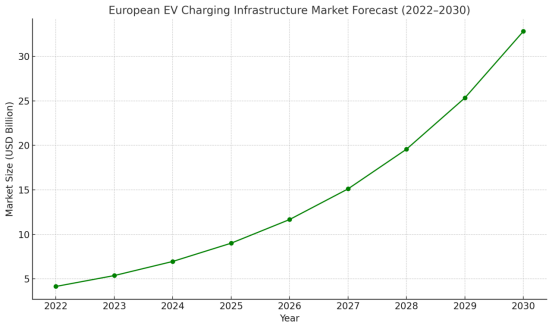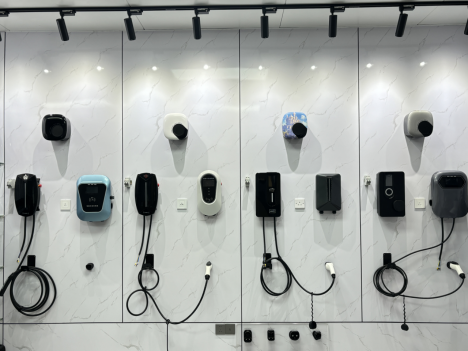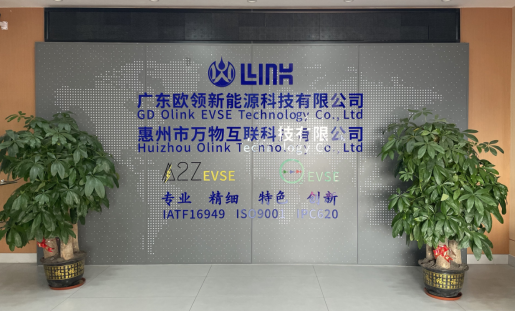The transition to electric mobility is rapidly gaining momentum across Europe, with electric vehicles becoming an increasingly common choice among new car buyers. This growing adoption is fueling an unprecedented demand for efficient and scalable EV charging infrastructure. This article explores the top 10 EV charger manufacturers driving innovation in Europe, highlighting their strengths and market strategies.
Market Overview
According to MarketsandMarkets, the European EV charging infrastructure market was valued at USD 4.15 billion in 2022 and is expected to reach USD 20.6 billion by 2030, growing at a CAGR of 29.49%. Government incentives, the Fit for 55 package, and rising EV adoption are the primary drivers behind this growth.

Criteria for Selection
Selecting the top 10 EV charger manufacturers involved a thorough evaluation based on several key criteria:
Market Influence
Companies with a substantial market share and broad reach were prioritized.
Product Innovation
Manufacturers demonstrating continuous innovation in their product lines were highlighted.
Sustainability Commitment
A strong dedication to eco-friendly practices and renewable energy integration was a crucial factor.
Customer Satisfaction
Positive customer feedback and high satisfaction ratings were also instrumental in the selection process.
Top 10 EV Charger Manufacturers in Europe
1.Siemens
Headquarters: Munich, Germany
Founded: 1847
Core Products: VersiCharge AC Series, DC Fast Chargers
Key Advantages: Smart grid integration, long-term partnerships
Notable Projects: Pan-European rollout in partnership with EnBW
Website: siemens.com/emobility
2.Shell Recharge Solutions
Headquarters: The Hague, Netherlands
Founded: 2009
Core Products: Public charging stations, home chargers, Shell Recharge App
Key Advantages: Backed by Royal Dutch Shell’s energy expertise, seamless charging network
Notable Projects: UK-wide Shell Recharge Network, major expansion into Germany and France
Website: shellrecharge.com
3. BP Pulse (formerly Chargemaster)
Headquarters: London, England
Founded: 1909 (Chargemaster acquired in 2018)
Core Products: Home chargers, fast & rapid DC chargers, commercial charging stations
Key Advantages: Aggressive expansion strategy, strong investment in renewables
Notable Projects: Plan to install 100,000 chargers globally by 2030
Website: bp.com
4.Schneider Electric
Headquarters: Rueil-Malmaison, France
Founded: 1836
Core Products: EVlink home and business chargers, fast charging stations, load management
Key Advantages: Energy management expertise, digital integration, sustainability leader
Notable Projects: Smart building integrations across Europe, partnerships with EV fleets
Website: se.com
5.ABB
Headquarters: Zurich, Switzerland
Founded: 1988
Core Products: Terra AC and DC fast chargers, high-power charging infrastructure
Key Advantages: Pioneer in DC charging, global reliability, robust R&D investment
Notable Projects: Europe-wide deployment of Terra 360 HPC stations
Website: new.abb.com
6.EVBox
Headquarters: Amsterdam, Netherlands
Founded: 2010
Core Products: Elvi (residential), BusinessLine (commercial), Troniq Modular (DC)
Key Advantages: Large global network, modular product design, strong SaaS backend
Notable Projects: Over 500,000 chargers deployed in 70+ countries
Website: evbox.com
7. Wallbox
Headquarters: Barcelona, Spain
Founded: 2015
Core Products: Pulsar Plus, Commander 2, Quasar (bidirectional charger)
Key Advantages: Smart energy management, elegant design, V2G-ready solutions
Notable Projects: Quasar 2 launch in EU and US markets, presence in 67 countries
Website: wallbox.com
8. Webasto
Headquarters: Stockdorf, Germany
Founded: 1901
Core Products: Webasto Pure, Live AC charger, DC wallbox solutions
Key Advantages: Automotive-grade quality, flexible production, scalable OEM support
Notable Projects: OEM partnerships with European automakers, own branded units
Website: webasto-charging.com
9. Efacec
Headquarters: Matosinhos, Portugal
Founded: 1948
Core Products: QC45 fast chargers, HV350 ultra-fast chargers, AC stations
Key Advantages: 75+ years of engineering experience, highly customizable solutions
Notable Projects: Major rollouts in Iberian Peninsula, metro bus and fleet depots
Website: efacec.pt
10. Allego
Headquarters: Arnhem, Netherlands
Founded: 2013
Core Products: Ultra-fast charging stations, Plug & Charge technology, public networks
Key Advantages: 100% renewable-powered stations, automatic billing authentication
Notable Projects: Over 35,000 chargers across 16 EU countries, collaborations with Shell
Website: allego.eu
Sourcing EV Chargers: European vs. Chinese Manufacturers
While European brands offer premium integration and local presence, many businesses seek cost-effective yet compliant solutions. Importing from China, especially from some certified OEMs has become a practical alternative.
How to import EV Charger from China to Europe
Importing EV chargers from China into Europe is a strategic move for businesses aiming to benefit from cost advantages and scalable production. However, navigating EU regulations, quality expectations, and logistics is key to success.
Market Research & Demand Analysis
Start by analyzing market needs—AC vs DC chargers, preferred output (7kW, 22kW, 50kW+), plug types (Type 2, CCS2), and competitor offerings. This helps position your imported products effectively.
Understand Legal & Regulatory Requirements
Understand EU directives that EV chargers must comply with, including CE, RoHS, REACH, and EMC. Check local requirements like WEEE (Germany) or ErP (France).
Find a Reliable Manufacturer
Work with manufacturers that are ISO9001-certified and have previous export experience to Europe. Platforms like Alibaba or direct manufacturers’ websites are good starting points.
Negotiate Trade Terms
Negotiate on minimum order quantity, lead time, Incoterms (FOB, CIF, DDP), payment terms, and whether the supplier supports logo or packaging customization.
Quality Inspection & Control
Before shipment, conduct pre-shipment inspection through a third-party agency and verify all certification documents to prevent customs clearance delays.
Logistics Planning & Freight Options
Choose the most suitable method—sea freight (cost-effective), air freight (fast), or train (for EU via China-Europe Railway). Negotiate Incoterms accordingly.
Customs Clearance in Europe
Ensure you have a valid EORI number. Provide accurate HS codes (e.g., 8504.40.90.90), invoices, packing lists, and compliance documents for a smooth clearance.
Import Duties & VAT
Expect to pay VAT (value-added tax) ranging from 19% to 25% depending on the country. EV chargers generally have low import duties, often 0–3%.
Distribution & Sales Setup
Plan your sales channels: direct to consumer, through EV installers, B2B resellers, or online platforms. Consider localized customer support options for credibility.
Ongoing Compliance & Safety Monitoring
Maintain compliance as regulations evolve—update firmware for ISO 15118 compatibility, ensure continuous EMC testing, and monitor product recall alerts.
Build a Long-Term Supplier Relationship
Work with manufacturers who view you as a long-term partner, offering product upgrades, private label services, and flexible MOQs.
Summary
Importing EV chargers from China to Europe requires more than just price negotiation—it demands knowledge of technical standards, customs, certifications, and a reliable partner. With careful planning and the right supplier, such as Olink, you can build a successful, compliant, and scalable charging business in Europe.
Why Choose Olink as Your EV Charger Manufacturer
Olink is a trusted EV charger manufacturer based in China, focused on providing smart, certified, and customizable charging solutions for global markets, especially Europe.

Compliance with EU Standards
All Olink chargers are CE, RoHS, and REACH certified, with full technical documentation and lab test reports to support smooth EU import.
Smart Technology Integration
OCPP 1.6 & 2.0 ready
ISO 15118 Plug & Charge supported
Dynamic load balancing
Mobile App and remote control
Wide Product Portfolio
AC Wallbox (7kW, 11kW, 22kW)
DC Fast Chargers (30kW, 60kW, 120kW+)
Portable chargers and charging accessories
Residential, commercial & fleet-use options
Strong R&D and Customization
OEM/ODM support (logo, shell color, software UI)
EU-certified PCBs and components
Fast adaptation for regional needs (e.g. German Market)
Competitive Pricing & MOQ Flexibility
Whether you’re a startup or EV infrastructure provider, Olink offers affordable entry points and scalable cooperation.
Reliable After-Sales Support
long-term warranty
Remote diagnostics
Fast-response technical team
Spare parts supply
Industry leadership
We have more than ten years of R&D experience in fast charging technology. With tangible results and customer-oriented innovation, we have won high recognition in the industry.
Successfully deployed 500+ charging systems, covering 30 countries around the world.
Own 50+ globally certified charging technology patents.
Choosing us is not just choosing a ev charging supplier, but also getting a complete set of market-proven technologies, future-oriented solutions and reliable cooperation guarantees.
FAQs About Top 10 EV Charger Manufacturers in Europe
1. What certifications do European EV charger manufacturers typically have?
Most top manufacturers are certified with CE, RoHS, REACH, EMC/LVD, and often comply with ISO 15118 and OCPP 1.6/2.0 protocols. These certifications ensure product safety, electromagnetic compatibility, and EU market compliance.
2.What makes European EV charger brands different from Chinese ones?
European brands focus on design, localization, and in-house integration, while manufacturers like Olink offer cost-effective, customizable solutions with strong R&D and faster delivery.
3.Are these EV charger brands suitable for both residential and commercial use?
Yes. Most top manufacturers offer AC wallboxes for home use (7kW–22kW) and DC fast chargers for public or fleet charging (30kW–350kW). Some, like Wallbox and EVBox, offer complete ecosystems for both residential and business needs.
4. Can I import EV chargers from China instead of buying European brands?
Yes, importing from certified manufacturers like Olink is a smart option. As long as the product meets EU compliance, includes CE, RoHS, REACH, and proper technical documentation, it can enter the European market legally and efficiently.
5.How do these top manufacturers support post-sale services across Europe?
Top brands like ABB, Siemens, and Schneider have extensive support networks in Europe, including remote diagnostics, software updates, and on-site technical assistance. Some Chinese brands like Olink offer remote support, spare parts, and 2-year warranty to ensure satisfaction.
Conclusion
The European EV charger market is growing rapidly, driven by innovation, sustainability, and user demand. Top brands like Siemens, ABB, and Wallbox lead in technology and service, while reliable Chinese suppliers such as Olink provide cost-effective, EU-certified alternatives. Whether you’re expanding your EV infrastructure or sourcing charging stations for resale, now is the time to act. Choose a partner that meets both your technical and business needs.
Ready to build your EV charger business in Europe? Contact Olink for a free quote or technical consultation.


